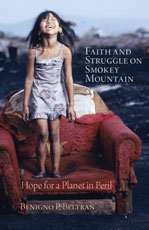Smokey Mountain was a gigantic garbage dump in Manila, Philippines, where tons of junk from all over the city were dumped every day. Benigo B. Beltran is a Society of the Divine Word priest who served for 30 years as the chaplain to the scavengers who depended on the dump site for their livelihood. He writes:
"Millions of flies and cockroaches and mutant rats (huge!) competed with 25,000 scavengers for survival — 25,000 men, women, and children who had been trampled upon, squashed, obliterated, condemned without trial to be a stinking class of human beings, carrying their rattan baskets like beasts of burden: people who had been lied to, deceived, duped, and spat upon all their lives. Hundreds of scavengers were figuratively crucified in the garbage dump, their hands and feet pierced by rusty nails and broken bottles while they searched for tin cans, scraps of paper and plastic bags, and climbed up their own Calvary."
Beltran charts the struggles of these poverty-stricken people to survive. He notes that their lives are shortened by the smoke, disease, and pestilence coming from the dump. Nonetheless, there are a small number who are willing to try and change Smokey Mountain, that place of "ravaged earth and wasted lives." Beltran laments the ethical irresponsibility of the rich who are responsible for a throw-away society and the toxins in the garbage and the waste.
The author pays tribute to the scavengers, and they provide him with some fresh insights into the Trinity and the new science. He states: "The scavengers became 'good news' to me, for they bore witness to the love and power of God who takes the side of the poor. With them, I was able to derive faith from doubts and hope out of paradox." Beltran reveals that the scavengers of Smokey Mountain had the dump closed down and housing built for them. Was it hope that kept them going? Yes, this spiritual practice helped them move beyond the darkness toward the light of a better life for themselves and their children.
